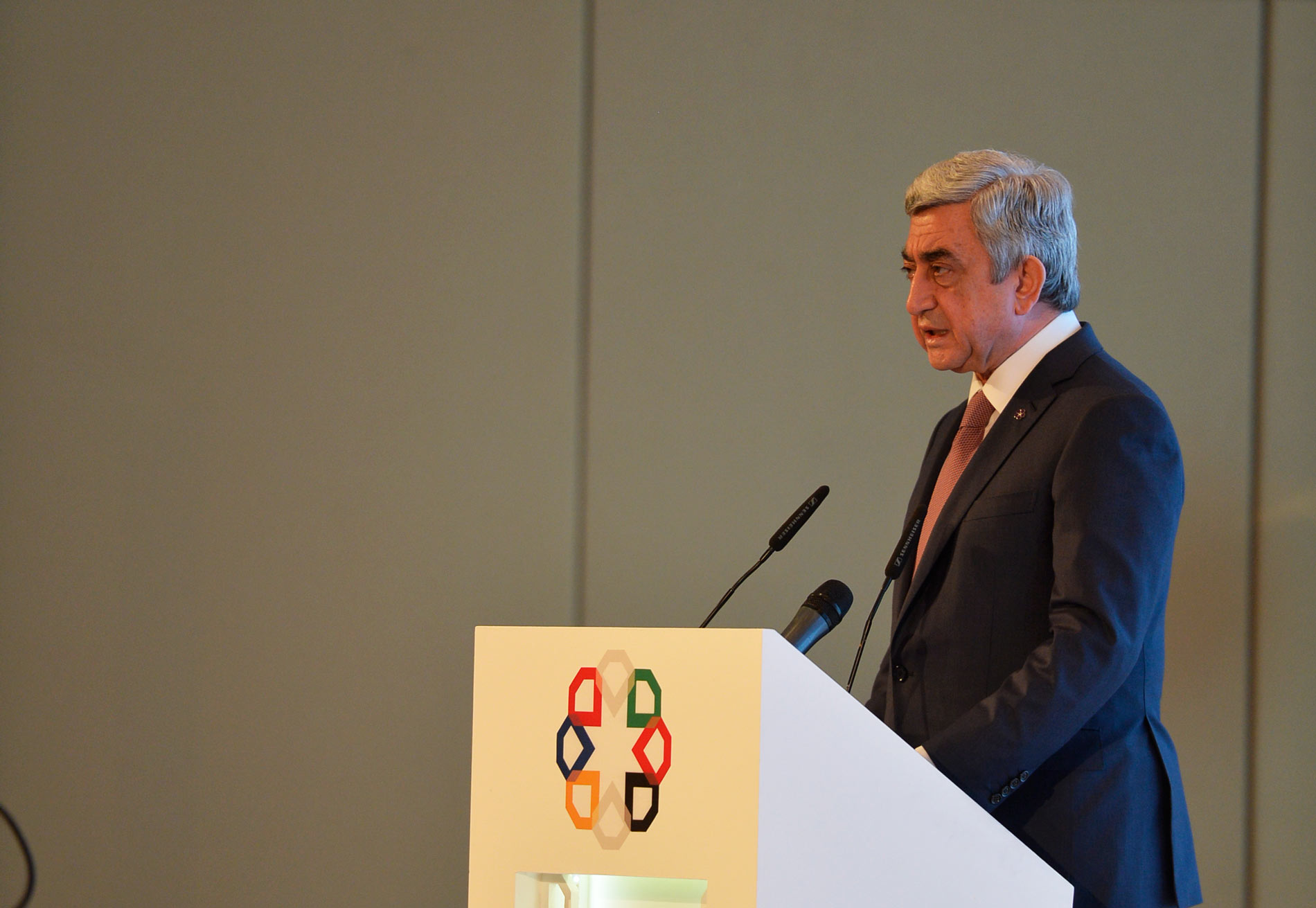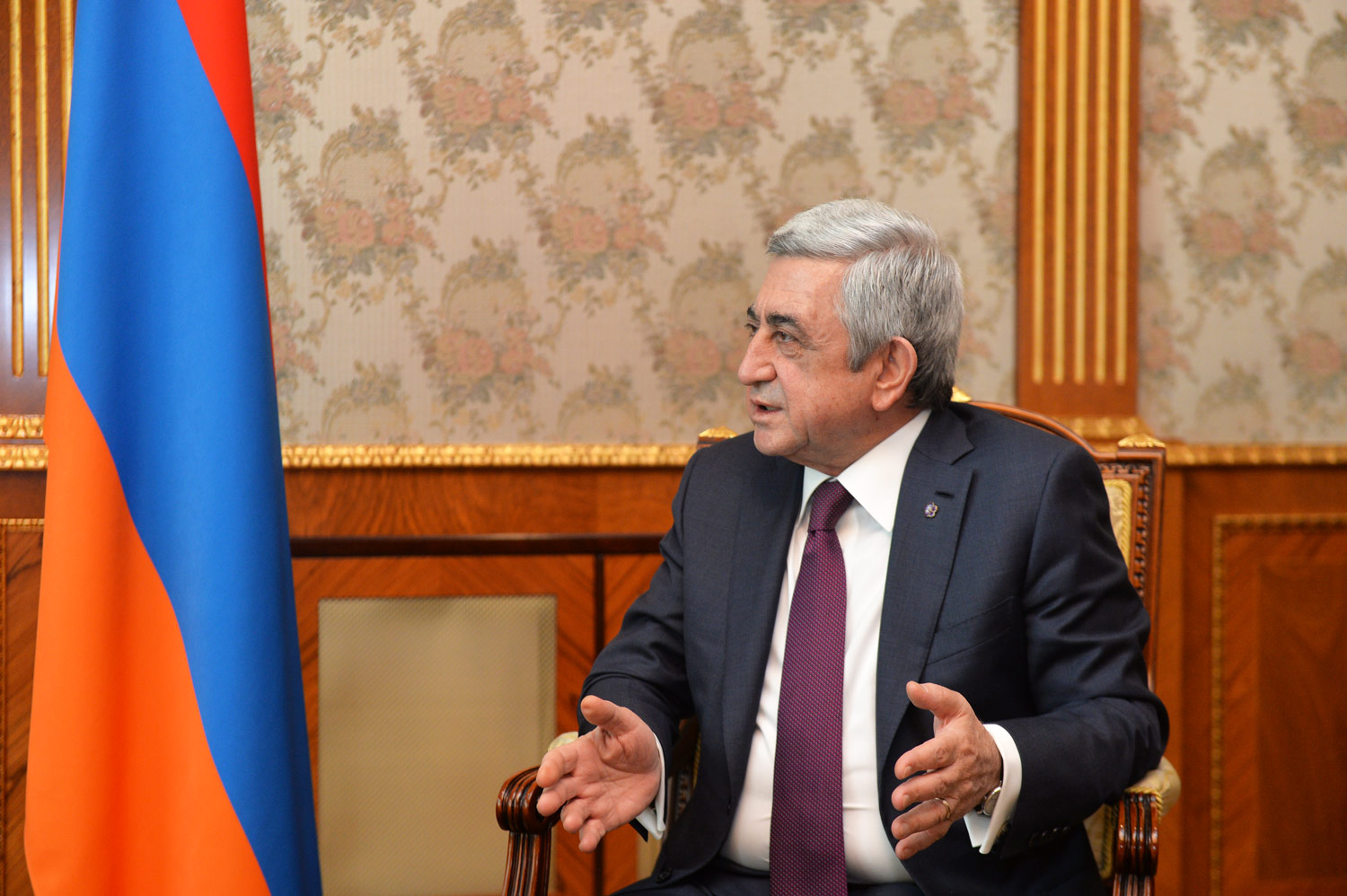As published in print with 

When President Serzh Sargsyan came to power in 2008, Armenia was feeling the grip of the global economic crisis. Now, a decade has passed and the country has a rapidly expanding economy and dynamic business environment as both a member of the Eurasian Economic Union and a signatory to an enhanced partnership agreement with the European Union

You took office in 2008 and were re-elected in 2013. What has been the economic narrative of Armenia under your leadership?
The beginning of my term as president coincided with a very difficult period in the economy. We felt the first shocks of the global financial and economic crisis at the end of 2008, but were able to consolidate our resources and develop an anti-crisis programme with the support of our allies and partners. By 2010 we were already able to register growth, but it was not enough. We wanted to transform that challenge into opportunities and re-emerge from the global crisis with a restructured economy. First, we wanted to give impetus to export-oriented sectors of the economy. To make that a reality, we have made significant advances in improving Armenia’s business climate and re-energised dialogue tracks with the private sector. What matters most – and this has been our main narrative in the past decade – is to create a conducive environment for the knowledge-based economy, including the IT sector. We have enough to celebrate at this stage. We have around 600 IT companies in the Armenian market, mostly export-oriented, including branches of world giants, and they are staffed by around 20,000 young and entrepreneurial professionals who make a huge impact on our country – in terms of business, culture and society.
What have been your most significant foreign policy priorities?
First, I have to say, that Armenia’s foreign policy has been based on four main dictums: being proactive, being engaged, being consistent and ensuring a firm presence where our interests require it. In the past 10 years we have continued our efforts aimed at finding a peaceful resolution in the Nagorno-Karabakh conflict and ensuring a sustainable peace between Armenia, the Nagorno-Karabakh Republic and Azerbaijan. Despite all our efforts and goodwill, supported by the United States, France and Russia, which form the co-Chairmanship of the OSCE Minsk Group – the main mediation format here – we have a long way to go. Our efforts have been further jeopardised by continuous ceasefire violations by Azerbaijan up to now, the flare-up in August 2014, and the Four Day War of April 2016. It’s unfortunate that the Azerbaijani leadership has long been misled by its oil money and still holds maximalist views on the resolution.
Since day one of my presidency, which by and large coincided with another war in our region in August 2008, we aspired to open a new chapter in our relations with neighbouring Turkey. At my initiative, supported by the international community as a whole and under Swiss mediation, we negotiated and signed two protocols in Zurich in October 2009, aimed at opening the common borders and normalising our relations. It’s unfortunate that the Turkish leadership backtracked from the spirit of signed documents and good neighbourly relations and put forward unrelated preconditions for the ratification and implementation. It was due to this position that I had to declare in September 2017 in the UN General Assembly and reiterate at the recent Munich Security Conference that in that unfriendly environment we have no choice but to shelve the documents in the archives of history. On March 1 the National Security Council further deliberated the matter and I signed a decree to terminate the procedures of conclusion of the Zurich protocols. Of course, we may pursue other opportunities in the future when the Turkish leadership matures.
Last but not least, in the present volatile international environment, we have remained faithful to our longstanding and principled position of seeking to benefit the common interests of our partners. We firmly believe that it’s our duty to bridge, where possible, the differences of our partners and allies, and not create additional tensions. That would be irresponsible. To that end, I must say, there is general consensus in our society about our foreign policy. It’s a dictum of this patient and principled policy that we chose to participate in both the Eurasian Economic Union – where in fact we became a co-founder – and sign the Comprehensive and Enhanced Partnership Agreement with the EU in November 2017. It is dear to our hearts to see our partners cooperating, while we all benefit from such cooperation. We have seen enough contradictions and wars in our history.
TIMELINE
UAE Deputy Prime Minister Sheikh Mansour bin Zayed Al Nahyan greets President Sargsyan at the Abu Dhabi International Airport in 2017. Photo: Office of the President
What other milestones have you accomplished during your presidency?
In a nutshell, and taking note of the times we are living in, I would single out three main results: a vibrant civil society, openness to dialogue and enhanced media freedom. All the rest are derivatives of these achievements. It’s on the basis of these realities that we felt strong enough to trigger the transformation to a full parliamentary system of governance, which will require participation across the political spectrum, responsibility from the ruling majority, minority protection and transparency where appropriate. All these domestic political transformations have been recorded by the political monitoring of the Council of Europe, and it’s due to this development that we think we are close to reaching a more advanced level in our membership in this important organisation.
Of course, we still face many issues and have a lot of homework to continue doing. But everything should be evaluated in a comparative context. I cannot compare our situation with that of Western European nations, but when put in a similar context to neighbouring nations, I can say that we are not lagging behind. Our GDP per capita is comparable to any of our neighbours’, our macroeconomic situation is stable, and the prosperity of our people is increasing step by step. The inflation rate over the course of the last three years was around 2%, whereas some of our neighbours registered double-digit inflation. You may be surprised to hear that the average salary in Armenia is higher than it is in Azerbaijan, which has oil and gas. Another telling figure is the fact that in 2007, when I was prime minister, the citizens of Armenia had about 200 billion Armenian drams in deposits in private banks – less than $500m. This year, that figure is almost 1.6 trillion drams, approximately $3.5 billion.
Last spring, you were with the Crown Prince in Abu Dhabi to promote economic ties between Armenia and the UAE. What is your vision for the future of trade and investment between the two countries and the greater Gulf region?
One of the major directions of our foreign policy has been cooperation with Arab countries. Drawing from a rich historical foundation for our relations, we have been able to establish good, mutually beneficial cooperation with the UAE, as well as with other countries in the region. These good relations that we enjoy should be taken advantage of and transferred into economic cooperation. The business forum we had last year in Abu Dhabi was a continuation of the discussions we held during my official visit back in 2016 and the discussions I had in person with His Highness Sheikh Mohammed bin Zayed Al Nahyan. Last year we established a visa-free regime for UAE citizens and for legal residence there. We also concluded a new agreement to encourage and protect investments. Meanwhile, many entrepreneurs made reciprocal visits: Emiratis to Armenia and Armenians to the UAE. The result in 2017 was that our trade turnover exceeded $200m. I believe this is just a small volume of the huge untapped potential that exists for economic cooperation – only about 15%-20%. Therefore, we will continue to draw closer and spare no effort in further fostering our relations with the UAE in all possible areas.
Speaking to investors, you said that “Armenia is not intimidated by constraints, but rather it turns them into competitive advantages”. You were talking about Armenia being a landlocked country with no fossil fuels, unlike some of your neighbours. What are Armenia’s competitive advantages?
In my view, every investor looks at three aspects in order to make a decision: human capital, consumption of goods and business environment. Our domestic market is no longer 3 million people – it’s a shared market of 170 million in the Eurasian Economic Union. There is also a market of 80 million in Iran, which is next door to us. In terms of human capital, Armenia also enjoys a comparative advantage in terms of the educational and professional advantages of the population. Furthermore, we have tens of thousands of people who consider Arabic to be one of their native languages. These are people who repatriated to Armenia from the Middle East. Throughout the Syrian crisis, we have received more than 22,000 Syrian-Armenians who had to leave their country. They have settled in Yerevan and in other regions and given a nice touch to the city, establishing numerous small enterprises, restaurants and cafés. This is also an important contributing factor to our development. We have always been at the juncture between the west and the east – we have been west for the east and east for the west. Throughout the history of these relations, we have acquired notions and qualities of cohabitation that are useful for us – so the environment is positive for Gulf investors. Location is another of Armenia’s advantages. We are well aware that dozens of planes are landing at UAE airports on a daily basis, transporting food, fruit, beverages and other items. They are arriving from faraway regions and flying for 10 to 11 hours. From Armenia to Dubai or Abu Dhabi, it’s just a two-and-a-half hour flight. We have an opportunity to provide this market with the best agricultural goods – meat, vegetables and other foods.

Photo: Office of the President
Data suggest that Armenia is among the main countries of interest for UAE tourists. What is it about Armenia that makes it such an attractive destination?
Armenia has all the qualities to be an attractive destination for tourists from the Gulf region or elsewhere. First, there is no visa requirement for UAE nationals, and the language issue is easily addressed and resolved. The country has a rich historical and cultural heritage and fascinating nature, as well as mild weather all year round. We have already established the necessary infrastructure and there are numerous ways for tourists to enjoy themselves – everything is available. Both Yerevan and Armenia in general are extremely safe.
What final message would you like to communicate to potential investors?
As a small country, we have the advantage that we work individually with every single large investor that arrives in our country. We furnish investors with privileges and tax breaks when their new enterprises produce goods that have not been produced here before. Any investment in Armenia is safe and protected.